
Do you know 67% of B2B marketers say that webinars give them the best content marketing results for their businesses?

So, it wouldn’t be wrong to say that hosting a webinar is an excellent way of establishing your brand’s credibility. It can also help you reach your prospective leads and convert them into loyal consumers.
But is conducting a webinar enough to boost conversion rates? The answer is no. You need to follow up with your attendees and convince them to convert. This is where email marketing can come in handy. After all, 57% of marketers leverage email as their go-to channel for webinar promotion.
This article will cover steps that would help you create a robust webinar follow-up email strategy. Let’s get going. Work on segmentation and personalization
Quick Reads
- Work on segmentation and personalization
- Include a questionnaire or survey in your follow up email
- Include a question and answer (Q/A) session in the webinar
- Provide exclusive offers
- Incorporate a solid call to action (CTA)
Work on Segmentation and Personalization
Marketers use personalization as their go-to marketing strategy to improve their email performance.
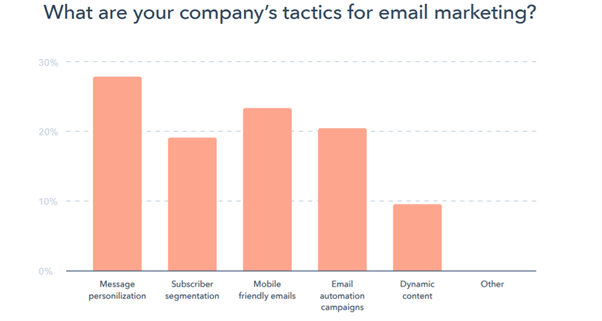
Businesses also use segmentation to boost consumer engagement.
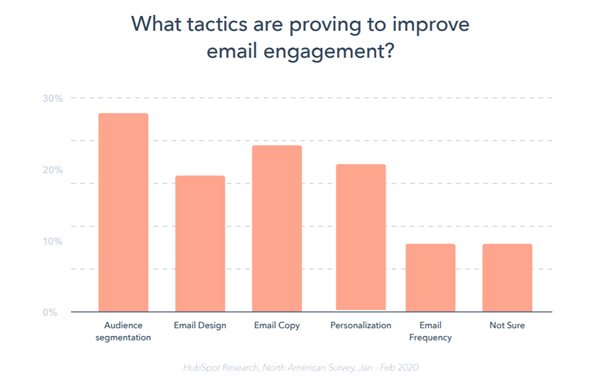
All in all, by segmenting your audience base, you can personalize your webinar follow-up emails better.
For instance, with proper segmentation, you can categorize your audience base and know the following points:
- How many of your prospective customers registered for the webinar?
- How many of the registered leads attended/did not participate in the webinar?
- How many of the attendees left the webinar midway?
- How many of them stayed till the end?
Once you know the above-mentioned crucial details, you can personalize your webinar follow-up email effectively. Take a look at this on-point follow-up email that is leveraging segmentation at its best:
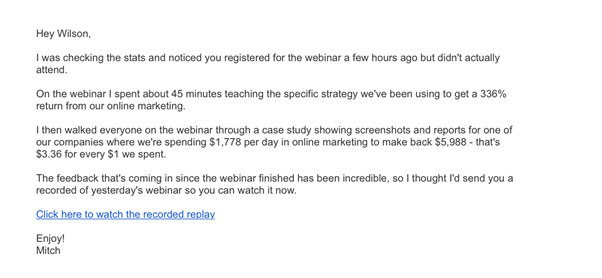
The best part about this email is:
- It is segmented and sent exclusively to leads who didn't attend the webinar.
- The email mentions the first name of the lead. It's a basic yet good way of personalization.
- The email includes the webinar takeaways with data-driven insights.
- Another major point is the replay link. The host ensured that even those who didn't attend the webinar could watch it and extract knowledge.
Here's another example of a simple webinar follow up email:
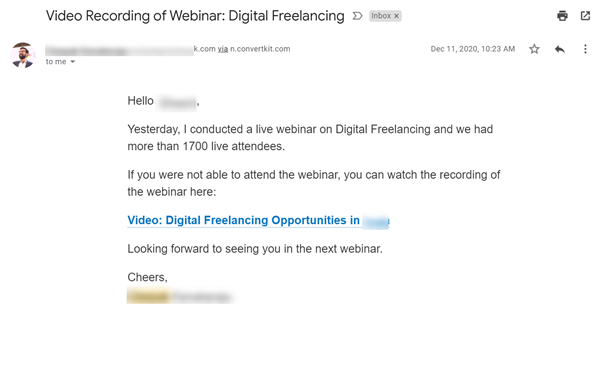
The key takeaways from this email are:
It mentions the number of people who attended the webinar. It's a great way of showing that this virtual event was successful. It also has a video link to the webinar. The email copy ends with a "looking forward" note. This, in turn, increases the probability of the targeted customer attending the next webinar.
Also, did you notice a common thing in both emails? Yes, it is the replay link of the webinar.
You can increase the engagement rate of your webinar by including a quick video link. After all, 43% of attendees want to watch recorded videos of webinars. Why? To understand the information mentioned in the webinar as and when they want.
Include a Questionnaire or Survey in Your Follow up Email
It is essential to take the feedback from your webinar's attendees. It will give you an idea about what your leads liked and what they didn't.
This, in turn, will help you improve your future webinars. Hence, send a survey email to your prospects right after finishing the webinar. Here's a webinar survey email that does the needful:
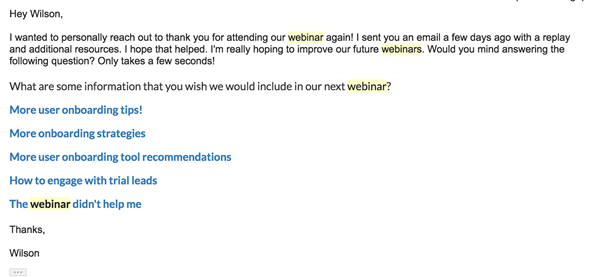
See how this survey email covers all the points. It will give the host a clear understanding of the attendees’ issues, thereby helping them develop potential solutions. No wonder 43% of webinar hosts use surveys to get feedback from their leads.
Include a Question and Answer (Q/a) Session in the Webinar
Do you know 86% of webinar hosts use Q/A sessions to personalize their follow-up emails?
Q/A sessions are a great way of knowing what each attendee is expecting out of the webinar. You should note down each question and make it a point to answer each of them. In short, make sure you send relevant and to-the-point answers to each attendee who asked a question.
Provide Exclusive Offers
Free resources, discounts, and coupons can help you turn your hot leads into customers. For instance, if you conducted a webinar on "How to kickstart your digital marketing career?, you can send your leads a free eBook on digital marketing.
Further, you can also offer the attendees a free one-to-one consultation call. This way, you are providing the attendees an added advantage for attending the webinar.
As mentioned above, as a host of a digital marketing webinar , you can hop on a call and help your prospects with the following aspects of digital marketing:
Ask them about their field of interest in digital marketing. Are they into search engine optimization? Or do they want to get into social media marketing? Tell them about the digital marketing courses they can take based on their interests. Give them expert tips on how to ace their digital marketing job interview.
You can take some cue from the SILVERPOP’s webinar email offering free resources to the attendees:
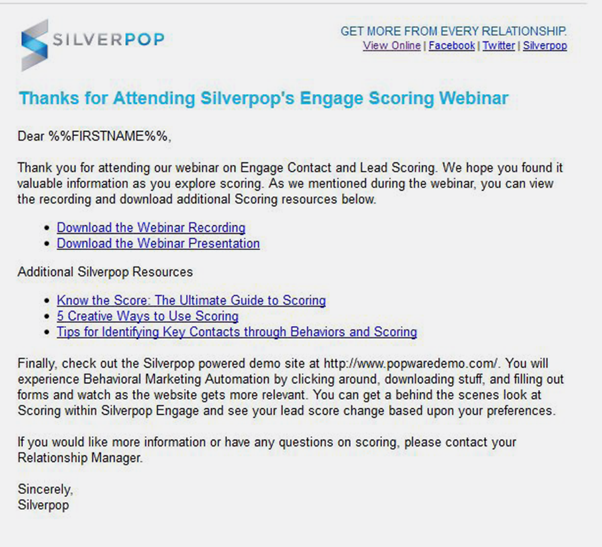
If you are busy scaling up your business, you can always take some professional help to create top-notch email follow-up content.
Incorporate a Solid Call to Action (CTA)
If your webinar is not leading to conversions , it doesn't matter how good it is. One of the best ways of increasing conversions is by compelling leads to take action.
So, whether you are giving a demo of your new software product or a free trial of a service, always include an enticing CTA at the end of your webinar follow-up email. Here’s how Neil Patel does it:
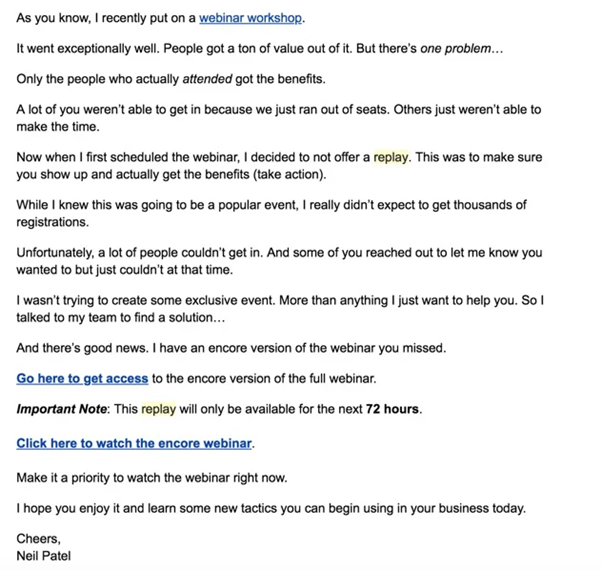
See how he is leveraging the fear of missing out through his email content by mentioning that the replay will be available for the next three days. Now that’s how you create a sense of urgency and compel leads to convert.
Conclusion
Businesses across the globe are leveraging webinars to accelerate their growth. After all, a good webinar is your gateway to striking a chord with your prospective customers.
However, don't consider it as a single-time marketing campaign. Make it a point to follow up and engage with your attendees. Start by connecting with them through an email right after the webinar. Ask them for their feedback through surveys and questionnaires.
Ensure that you are segmenting and personalizing your email list. It will help you send relevant webinar follow-up emails to your prospects. You can also provide your attendees’ discounts and offers to entice them to convert. Further, incorporate a strong CTA and give them a reason to choose your product and services.
In a nutshell, a webinar follow-up email is the best way to help you establish a long-lasting relationship with your customer base.
Author's Bio
Adela Belin is a content marketer and blogger at Writers Per Hour. She is passionate about sharing stories with the hope to make a difference in people's lives and contribute to their personal and professional growth. Find her on Twitter and LinkedIn.



